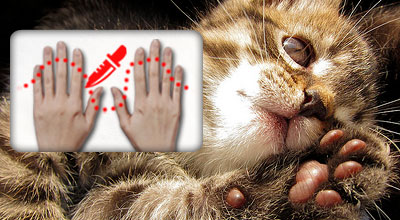
Declawing Q ‘n’ A
Is declawing painful to my cat?
YesIt is not like getting a nail trim or a manicure. Declawing your cat is equivalent to chopping a human’s fingers and toes off at the first knuckle. That hurts. Your cat will be in pain after he wakes up from the surgery, and the pain will continue for a long time, perhaps even for the rest of his life. Your cat’s claw can continue growing inside the paw, which becomes extremely painful.
Does declawing maim my cat?
YesLike a human who has had their toes chopped off, a cat must relearn how to walk and balance. This relearning process is straining to the muscles. In addition, common complications during the surgery include permanent nerve damage, skin disorders, and painful scar tissue formation and bone chips (which require additional surgery).
My cat stays indoors. Does he really need his claws?
YesClaws are your cat’s first line of defense. Even if you keep your cat indoors, there is always the possibility that he might slip through the door when you’re juggling four bags of groceries and your kid’s hyperactive playmate. If your declawed cat were ever to accidentally find himself outdoors, he would be easy prey for wildlife and stray dogs and cats. In addition, cats scratch as a form of exercise and playing. Depriving your cat of this natural exercise causes muscle deterioration.
But I have a baby and don’t want my cat to scratch him. A declawed cat is safer for my baby, right?
WrongSince claws are your cat’s first line of defense, robbing him of his claws causes him to feel very insecure. This insecurity often leads to aggression, unpredictability, and shyness. Declawed cats are more likely to bite your baby in self-defense (pudgy, flailing baby arms might seem harmless, but it hurts when your cat accidentally gets bopped in the nose!). Not only that, but declawed cats must resort to other means to mark their territory. This means that your cat is more likely to urinate and defecate outside of the litterbox. Not only will you be on diaper duty, you’ll have to clean up after your cat before your baby finds a “tasty treat.”
But declawing isn’t illegal, right?
Declawing is illegal in almost two dozen other countries, including Australia, England, and Japan, because it is viewed as horridly unethical. Although it’s not illegal in the USA, it’s widely seen as an atrocity, especially by veterinarians. Most vets refuse to perform the procedure because they consider it so unethical.
But I don’t want my cat destroying my furniture. Isn’t declawing my only option?
No
The main part of the claw that snags upholstery is the sharp, curved tip. Trimming your cat’s nails regularly will protect your furniture from serious damage. When your cat is calm and relaxed, gently squeeze his toes until his claws unsheath. Using cat nail clippers, trim off the tip of the nail, careful not to trim as far as the dark vein running through the claw, or the “quick.”
Along with regular trimmings, buying a few scratching posts will allow your cat to scratch his heart out without scratching to the heart of your sofa. Simple cat scratchers start at just around $5, but if you want something that will look classy in your living room, you can pamper your cat with scratchers like these:
I bought my cat a great cat scratcher, but he still scratches my couch instead. Is it time to declaw him?
NoDo not think of declawing as an alternative, or even as a “last resort.” Declawing is inhumane and absolutely avoidable. There are numerous ways to train your cat to only scratch his cat scratcher. One scratcher usually isn’t enough, so consider buying multiple (different kinds) of scratchers. Locate one near the sofa (or wherever your cat likes to scratch), and one near his bed (the morning routine cat stretch includes scratching). Make the scratcher a fun place: play with your cat there and sprinkle catnip, or even cat treats, on the scratcher. Never discourage your cat from scratching the sofa by physical force. Instead, deter your cat with a loud voice when he scratches the sofa. You can also put double-sided tape on “scratch-free zones,” or spray the area with a lemon scent (cats don’t like citrus). If your cat still refuses to break old habits, you can spray his back with lukewarm water when he goes for your sofa (however, do not spray kittens with water, as this is very traumatizing for them).
Will my cat still love me if I declaw him?
NoAnd isn’t that all that really matters?
 About the Author
About the AuthorJoanna Tang, our Youth Board Liaison from Gunn High Scool
Photo Credit: Steve Jurvetson





